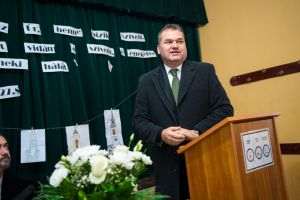• Instead Of A Preamble
The Year 2008 will remain in the history of Romania as a year to remember. The year of the bisecting line, the year when the World woke up! And when we woke up in line with the World.
First, the power and the counter-power woke up. And their acolytes. Brought in the face of disaster, they were forced to understand that the private economy and the market system are law-makers, the makers and breakers of prosperity. That without them, Romania cannot exist, that the public economy is derived, conveniently or inconveniently - depending on its immediate efficiency - from the demographics of the real economy and that any decision that disregards it or works against it is inexorably generating instability and poverty.
Then, the population woke up. Available and still (!) manipulable, they understood however that the puppets belong in the puppet theatre and not in the social, economic and political life of the Country, that the sovereignty they bestowed upon themselves constitutionally must smell like bread and real prosperity and has nothing to do with the Vespasianism that has become the dominant culture in the society.
Finally, the individual conscientiousness, in fact the only source of power and hope, woke up and realized the obsolescence of the herd. God willing, may it stay awake! As it is, problems are interweaving and the road ahead is already full of holes. Political, (especially) economic, social, moral , cultural, inter- and intra-generations and, last but not least, trans-national. Not to mention the crisis to which we invited ourselves.
I recently explained in an article that the main form of remunerating the individual as "beneficiary" - the salary - had been hijacked through all sorts of workarounds, unlawful accounting, the conventionalization of heterodox financial, banking and accounting mechanisms that have become alienated (the ex-nihilo creation of currency, the ex-nihilo creation of added value from the ex-nihilo creation of currency etc), which is in fact an institutionalized robbery of the results of labour and the well-deserved prosperity.
Despite the obvious (the private economy is irrefutably the single source of prosperity!), the offensive of the public economy against the private economy continues. Obviously, the public economy is ferociously supported by its prime beneficiary - the political Power - which is making compromise after compromise, all of which is corrupt and specifically addressed (but not to taxpayers or entrepreneurs) and foul everything they touch.
This is the general context of the consolidated projection for the State Budget 2009, which is based on old "news" that can only be explained against the broader background of a clumsy Government which, in the face of a national disaster, has taken a crooked bearing on its constitutional purpose and realizes that the economic disaster, which was so carefully and conscientiously constructed, has exceeded the "holy" phase and is perversely desacralizing into earthly threats.
If we only speak of certainties, we can refer to:
- a global market that is turning into jelly and its immediate consequences (the closure of the easy consumer markets, unemployment, the reduction of the national capacity to generate revenue, the unstoppable surge of fiscal and semi-fiscal arrears, the drastic under-sizing of public revenues etc);
- the excessive increase of the foreign deficit (a gross foreign debt big enough to cause concern, to say the least!!) created though an uncontrolled, inefficient and ineffective exposure of the Country with major repercussions on the capacity to finance the economy and refinance the foreign debt, including an unhealthy increase of the number of default cases Romania could be facing, in between the Caudine Forks of the IMF!
- the individuals" significant indebtedness (RON and forex-denominated loans, many of which are consumer loans), which exceeds 35% of the GDP forecast for 2009 and, given the general decrease in solvency, generates banking arrears;
- the continuously weaker and more ridiculous capacity of the politicians to fool their constituents.
• Facts:
a) Individual loans: 51.859.643.051
b) Romania"s foreign debt service for 2009: ~34 billion EUR
c) Gross foreign debt (assets deficit as of 31 December 2008): 72.03 billion EUR
d) Gross Domestic Product 2009 (target): ~579 billion RON (144.75 billion EUR1)
e) Over-spending financed through public debt (the deficits of the public budgets comprised in the General Consolidated Budget):
- million RON -
Account200720082009
State Budget- 15,388.9- 19,859.7- 19,077.7
Local Budgets-1,354.7- 3,697.9-
State Social Security Budget-- 27.1-
State Health Care Budget-- 484.3-
Foreign Loans - 2,578.4- 2,160.1- 351.4
Domestic Loans-2.3- 11.5- 4,800.0
CNADNR Budget-- 1,237.4- 99.8
ANRP Compensations- 833.0- 3,585.0- 1,170.0
Expenditures assimilated to Public Debt (-)2,419.02,668.33,900.5
General Consolidated Budget deficit, total- 17,738.3- 28,394.7- 21,598.4
General Consolidated Budget (perpetual scarcity)
Depending on the budgeting principles taken into account, reality proves that the budget deficit can be sized at will. As the revenues of the General Consolidated Budget are derived from the unyielding sizing of the monetary resources that have been / will be turned into budget revenue, the only honest alternative to quantify the GCB (as overspending) must consider, by relating to the revenues it is financed from, only such overspending (Tabel A), and not any surplus which, by projection, execution, or addition, have been computed (out of a narrow political will!) into some budgets included in the overall structure (Table B).
The adoption and implementation of the accounting balance for determining the deficit/surplus of the General Consolidated Budget (Accounting balance = 3 Revenue - 3 Expenses) causes a decrease in the deficit - in fact, some overspending, compared to the available revenue! - as a result of the effect of the communicating vessels (the surplus of some of the budgets partially offsets the deficit of the other budgets in the overall structure).
a) the budget deficit as the sum of overspending:
- million RON -
Account200720082009
Overall revenue134,173.3164,466.8193,789.0
Balance (revenue deficit)- 17,738.3- 28,394.7- 21,598.4
Deficit (% of GDP)4.305.533.73
b) the budget deficit levelled through the communicating vessels effect:
- million RON -
Account200720082009
Overall revenue134,173.3164,466.8193,789.0
Balance (revenue deficit)- 12,968.0- 25,472.8- 11,901.5
Deficit (% of GDP)3.144.962.06
As we can see, the levelling of the budget deficit concealed certain overspending, which amounted to 4,770.3 million RON (47,703 billion ROL) in 2007 and to 4,556.6 million RON (45,556 billion ROL) in 2008. For 2009, the same recipe is intended to conceal 5,430.4 million RON (54,304 billion ROL). Moreover, the deficit calculated for 2009 does not include the deficit generated by domestic loans (= r).
At the end of Q1, 2009, the medium-term deficit generated by discount treasury bills and benchmark bonds will reach 4,200 million RON or 42,000 billion ROL. The already predictable deficit is nearing 25,000 million RON (one quarter of a million of billions of old lei!)
• When The Bard Is Right
The surplus created by political decision into some budgets (usually the socially-oriented budgets built on the principle of social solidarity) has no effect on the real spending because - although from an accounting point of view it offsets some of the overspending - it does not modify the real consumption of financial resources. Moreover, the conventionally constituted surplus of the respective budgets is actually just a financial resource available (only available) to those budgets, but, given the budgeting principle that says that a resource created by the fiscal or semi-fiscal taxation of the taxpayers" current revenues goes to the destination stipulated by the law which created it (i.e. the production of public goods and services for the fiscal laws - the State Budget and the local budgets or the financing of social security - for the social security budgets etc).
The transfer of financial resources between budgets takes place only through the specific mechanisms and laws (i.e. transfers of social security contributions between budgets), which are already contained and highlighted in the General Consolidated Budget.
From this point of view, we should take notice of another aspect, which, unnoticeably has led to the conventionalization of some inconsistent applications in the structure of the General Consolidated Budget.
Transfers of funds from one budget to the next are made based on the budget revenues constituted under the laws that ensure the financing of every budget. In other words, this is a form of revenue transfer.
Consequently, the expenditures from transfers cannot quantify more than the transfers of revenues.
The situation appeared in 2008 and is repeating in 2009 (3 revenue transfers ... 3 expenditures from transfers) and is just a form of culpable corruption of the accounting mechanisms.
The proof of this mystification is that the reallocation of the revenues between budgets is an application of the game theory, respectively, the zero-sum game: 3 outgoing = 3 incoming. Moreover, according to the Finance Law, budget execution is without exception stand-alone and independent across budgets. In plain words, it means that the deficit of one budget cannot be financed from the surplus of another budget!
In fact, through an intentional misunderstanding of the mechanism (the avoidance of double entries), the decision-makers have developed a sui generis application whereby the expenditures from transfers are larger than the transfers from revenues.
The particular reason behind this application is quite petty: to conceal some of the deficit created by over-sizing the spending (it does not matter whether it was intentional or not!).
The deficit concealed in this way was 817.7 million RON (8,177 billion ROL) in 2008 and is projected at 114 million RON (1,140 billion ROL) for 2009.
Everything else is fine. Dead fine!!





























































